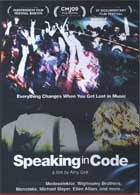
Speaking in Code 2008
Distributed by Microcinema International/Microcinema DVD, 1636 Bush St., Suite #2, SF, CA 94109; 415-447-9750
Produced by David Day
Directed by Amy Grill
DVD, color, 98 min.
College - Adult
Music, Electronic Music, Popular Music, Techno Music
Date Entered: 09/20/2010
Reviewed by Vincent J. Novara, Curator, Special Collections in Performing Arts, University of MarylandA successful documentary film should engage the viewer to such an extent they become personally invested in the outcomes of the topics or the people who meant little to them before the film began. Speaking in Code, a film about the subculture of electronic dance music (or techno), accomplishes that. The select techno artists, fervent advocates, and music itself will earn the empathy of viewers of the debut documentary by director Amy Grill and producer (and husband) David Day. Grill explains in the film’s opening narrative, “This is the story of people who get lost in techno music, and in many ways this is the story of us.”
While they both live for this music, Day is much deeper involved in all parts of the techno world as a DJ, promoter, critic, collector, and manager at Forced Exposure (US-based dance music distributor). As the film progresses, Day evolves from a commentating authority, to a subject equal to other key techno figures.
A result of producing a documentary about the techno scenes in North America and Europe is the film resembling a travel movie. Wanderlust is exhibited early in Speaking in Code when the filmmakers travel from their hometown of Boston through a snowstorm into Montreal to attend a Wighnomy Brothers show. By the film’s end, their sojourns include San Francisco, Barcelona (Spain), Amsterdam (Netherlands), and four cities in Germany: Berlin, Cologne, Hamburg, and Jena. At these places they visit warehouse parties, clubs, private parties, home studios, record stores, and techno labels offices.
The role of Germany’s reunification in the development of techno is also explored. In the film, multiple artists claim that the fall of the Berlin Wall, the squatting potential for rogue clubs established in Berlin’s abandoned buildings, and the need for some form of a unifying culture (aside from soccer) enabled techno’s rise in Germany. Indeed, the vast majority of the advocates and artists interviewed for this film are German.
These artists include inventor/performer Robert Henke (stage name: Monolake); the Berlin based duo Modeselektor; Jena’s Wignomy Brothers; and DJ, critic, and BPitch Control label owner, Ellen Allien—the sole female performer featured in this film. The German techno label Kompakt receives extensive footage and is portrayed as a standard-bearer for this global subculture of music. The filmmakers also follow Philip Sherburne, American journalist and DJ, to various stops in Europe following his departure from San Francisco to fully embed himself in European techno culture
These international travels are openly discussed as a source of mounting debt for the filmmakers and as a wedge in their marriage. As the film progresses, the strain on their relationship is further apparent as Day devotes more energy to bolstering a techno scene in Boston, and Grill takes every opportunity to pursue what she refers to as “economy jet-setting.” Furthermore, the filmmakers gradually lose focus on their project—each distracted by their heightened status in the techno community—and the objective of Speaking in Code also loses focus. The recurring shifts between Boston and various European cities render the narrative disorienting. It is not until Grill’s closing commentary that she explains that the film’s constant changes of location matched her impulsive quest for footage.
Overall, the film provides an excellent examination of techno music’s practitioners and advocates, but yields little regarding the average audience member. The glimpses into the creative process and the common tools of today’s artists will prove interesting to music scholars. The presence of vinyl LPs as the most prevalent form of distribution and the use of vintage audio gear in performers’ home studios is remarkable for a field of music driven by advancing technology and provides interesting insight into techno music culture.
Viewers seeking further context on techno may appreciate the dramatization 24 Hour Party People (United Artists, 2002) covering the history of Factory Records and its connection to the early history of electronic dance music in Manchester, England. Speaking in Code is an excellent and engaging addition to current commentary on techno and other contemporary music trends.